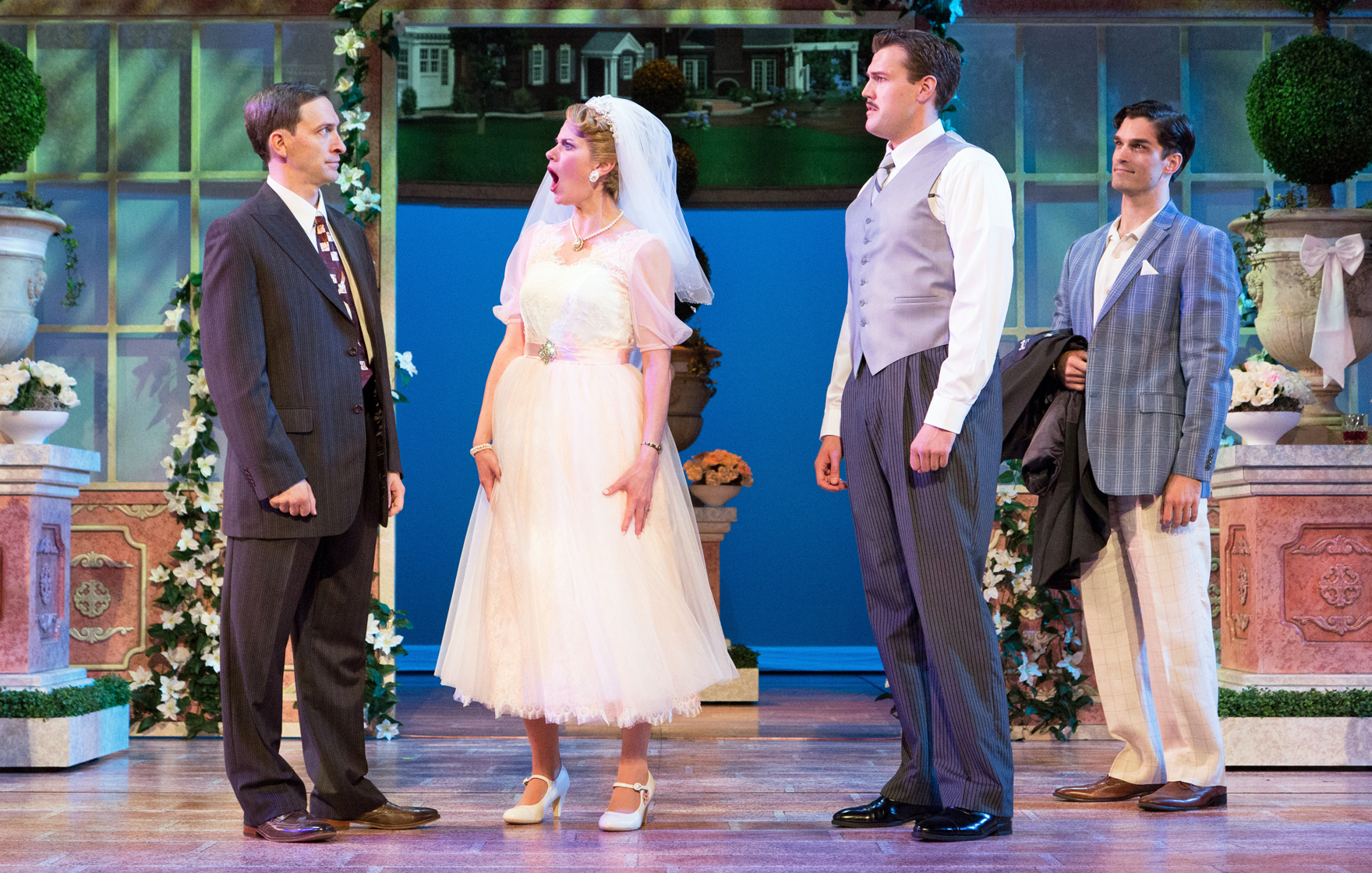
High Society. Music and lyrics by Cole Porter, book by Arthur Kopit, based on the play The Philadelphia Story by Philip Barry and the motion picture High Society. Walnut Street Theatre, Philadelphia, 2015
*
Because it is based on a memorable play and film about a famous Main Line family, it’s a shame that this production of High Society is so lacking in class.
Philadelphia’s Walnut Street Theatre is renowned for its excellent productions of classic musicals but this show fails to meet that high standard. The fault is mainly not the Walnut’s but, rather, the producers of this adaptation that ran on Broadway in 1998. They took a breezy and sophisticated comedy and turned it into a crass sit-com.
The show is based on the real, highly-cultured family of Hope Montgomery, whose father was an investment banker and who married the grandson of the president of the Pennsylvania Railroad, then the world’s largest corporation. Playwright Philip Barry was a Harvard classmate of Hope’s brother and his script was closely based on reality, although he re-named Hope as Tracy Lord.
Hope was a devotee of fox hunting and horse shows, age 34 in 1938, while her sister Mary Binney was a 30-year-old ballet dancer and piano soloist with the Philadelphia Orchestra. (The play changed the younger sister into an adolescent.) They lived in a 45-room mansion designed by the gilded-age architect Horace Trumbauer near the border between Radnor and Villanova.
The actors in this production still talk about it being 1938 but they don’t appear to inhabit that era. The costumes, language and attitudes are all wrong. And they relentlessly mug for laughs instead of engaging in sophisticated wordplay.
The story tells how the super-cool heroine is defrosted on the eve of her scheduled wedding to the wrong man, and reunited with her true love, her ex-husband. In the original play and movie, Katherine Hepburn captured the essence of Hope while her husband was elegantly played by Cary Grant. When the story was musicalized in the film High Society, Grace Kelly brought cultivated reserve to the part while Bing Crosby was her suave ex-husband.
In this reincarnation the characters became cardboard cutouts who don’t sound authentic nor dress accurately. In particular, ex-husband Dexter (Paul Schaefer) has slouchy posture and wears the sloppy clothes of a college frat brother who wouldn’t be admitted to any home on the Main Line. And Megan Nicole Arnoldy wore a wedding-day red dress that reeked 21st-century knockoff instead of a chic outfit befitting a millionairess in 1938.
In the film High Society the locale was changed from the Philadelphia suburbs to Newport, Rhode Island, which allowed a romantic scene on a yacht. In 1998 and here now, a small model yacht is the inadequate substitution. The adapters literally missed the boat!
The best thing about this production is the Cole Porter music, but even that has been bruised. Porter didn’t write enough songs for the film to fill a full-length Broadway show, always a problem when adapting a film for a stage production. Movies rely on visuals and have far less music; you have to add songs that were written for other venues.
Two of the extraneous numbers were inserted with cleverness. Tracy made her stage entrance direct from horseback riding and sang the borrowed 1936 Porter song “Ridin’ High.” An even earlier Porter hit, “Let’s Misbehave” from 1927, was used to accompany a drinking scene. Those were fine, but the other nine outside songs were shoe-horned with scant relevance to the characters or the plot.
The most-avoidable musical misstep was changing the song, “Well, Did You Evah?, What a Swell Party This Is,” where Crosby and Sinatra swapped one-liners, and turning it into an ensemble in which the men barely appeared.
Arnoldy is a brash belter who was best when loud and not so appealing when singing softly. Ben Dibble stole the show whenever he was on stage, playing the magazine reporter who crashed the party. (That was Jimmy Stewart in the original and Frank Sinatra in the film musical.) He’s stylish and graceful and croons romantically. Grace Gonglewski’s considerable talents were under-used in the role of Tracy’s mother. Dan Schiff did well with the crude character of Tracy’s skirt-chasing uncle. Jon Reinhold had the unenviable task of playing the pompous fiancee, yet he excelled with his strong baritone singing.
I sympathized with musical director Douglass G. Lutz who only had eight players to accompany the classic Porter songs.
Read more reviews on The Cultural Critic